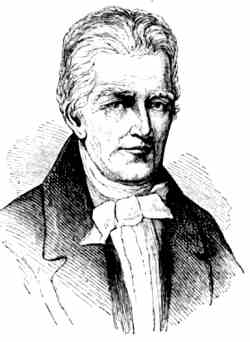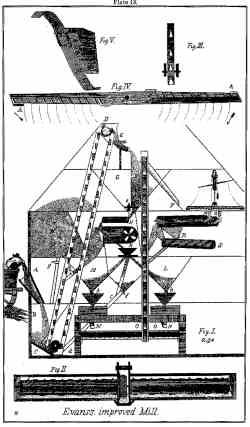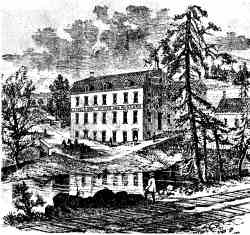Collecting Delaware Books
Oliver Evans, 1755-1819
American Inventor
Contents



Biography
Oliver Evans was born in 1755 in Newport, Delaware. In his teens he was apprenticed to a wheel-wright. His inventive genius blossomed, and in his twenties he invented a machine to improve operations in the textile industry. His most important inventions, however, were in the field of flour milling. He designed a system of conveyor belts, moving buckets, and screw feeds to automate grist mill operations.
Evans installed his machinery in a mill on the Red Clay Creek near where it crosses the present-day Faulkland Rd. (Delaware State Road 34). This building was sold later to a spice milling company. He also installed his improvements in Greenbank Mill in Delaware, which today is being actively restored by a volunteer organization. Patents were hard to obtain and difficult to enforce in those days. Evans moved to Philadelphia about 1793 to spend more time protecting his inventions.
After he was granted one of the first U.S. patents, many people licensed his system, including George Washington and Thomas Jefferson for use in their business enterprises. Later, he corresponded with Jefferson about extending his patents. Jefferson believed in patents to encourage invention, but opposed extending the monopoly beyond the statutory 14 years.
As an additional source of income he published The Young Mill-Wright and Miller's Guide in 1795. This book went through many editions and was still being printed in 1860. A 1795 first edition in collectible condition sells for about $5,000 today. The 1807 edition, of which only nine copies are known, sells for about $2,000. The 1826 edition sells for several hundred dollars. Damaged copies of all editions can be found for a few hundred dollars.
A facsimile reprint of the 1795 edition of The Young Mill-Wright and Miller's Guide was available from the Oliver Evans Press in Wallingford, Pa., in the 1990s. Copies sell on the used book market for $100 or so.
The book is a complete treatise on the mechanics and hydraulics of water-powered grist mills and has many excellent drawings, some of them fold-outs. Evans was not an educated man, and there has been some doubt about whether he wrote all parts of the book.
Evans went on to invent improvements in the steam engine which were widely adopted in England and the United States. He designed a steam-powered dredge for Philadelphia which was never fully operational. He is also credited with the first self-propelled vehicle, a steam omnibus.
Learn More
There is a huge amount of material available on Oliver Evans, both in print and on the Web. It is worthwhile using an Internet search engine often as new material appears regularly.
- The definitive book on Evans is Oliver Evans, a Chronicle of Early American Engineering by Greville Bathe and Dorothy Bathe, published in 1935 and frequently reprinted. Check used book sites like AddAll.
- A useful pamphlet is Two Mills on Red Clay Creek in the 19th Century … by Carroll W. Pursell, Jr., 1964. This book has become hard to find.
- Those involved in restoring Greenbank Mill maintain a Web site.
- The Morris Library of the University of Delaware has extensive holdings including microfilms of his attempts to obtain better patent coverage.
- There is an extensive bibliography by Theodore R. Hazen, a professional mill restorer at Angelfire.
- A discussion about authorship claims by Theodore R. Hazen is at Anglefire, also.
- American Heritage Magazine has dozens of articles articles on it its archives which can be searched on the site.